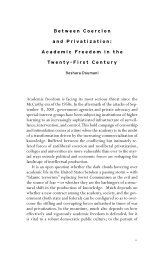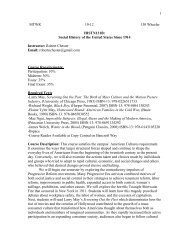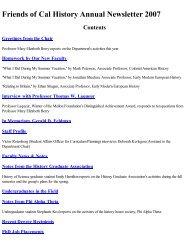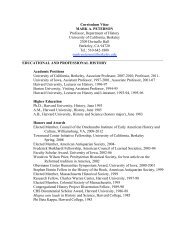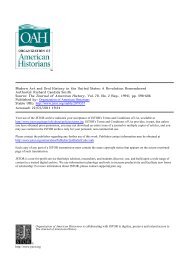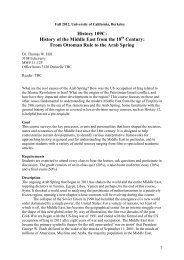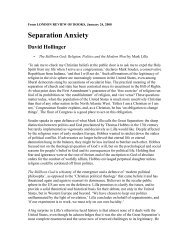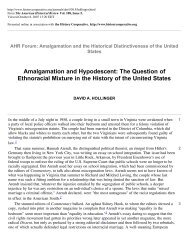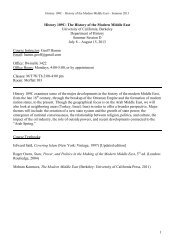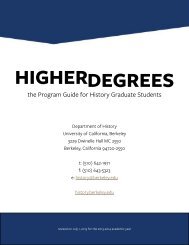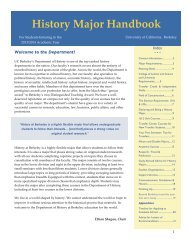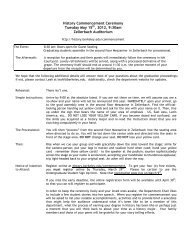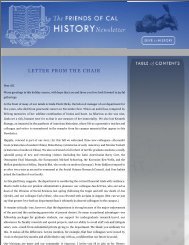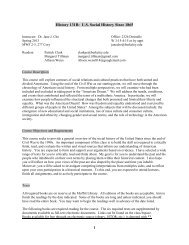My Grandmother and Other Stories: Histories of the Palestinians as ...
My Grandmother and Other Stories: Histories of the Palestinians as ...
My Grandmother and Other Stories: Histories of the Palestinians as ...
Create successful ePaper yourself
Turn your PDF publications into a flip-book with our unique Google optimized e-Paper software.
<strong>the</strong>refore, that <strong>the</strong> greater <strong>the</strong> distance from <strong>the</strong> kin/l<strong>and</strong> matrix, <strong>the</strong> more constitutive<br />
it is <strong>of</strong> one’s political identity. In George Bisharat’s wonderful phr<strong>as</strong>e, recovering<br />
<strong>the</strong> family/place connection becomes a vehicle for “remembering <strong>the</strong> future.” In yet<br />
ano<strong>the</strong>r symbolically-laden observation, Nazmi Jubeh tells us how Sheikh H<strong>as</strong>san<br />
during his decades’ long confinement in mental hospitals kept this connection alive by<br />
carefully unwrapping <strong>and</strong> wrapping a h<strong>and</strong>kerchief containing a h<strong>and</strong>ful <strong>of</strong> dirt five<br />
times a day for <strong>the</strong> purpose <strong>of</strong> wudu’ (w<strong>as</strong>hing before prayer).<br />
Third, writing <strong>Palestinians</strong> into history raises difficult questions about what is<br />
universal <strong>and</strong> what is specific in <strong>the</strong> modern human experience; about <strong>the</strong> messiness<br />
<strong>and</strong> vagaries <strong>of</strong> contingency in history; <strong>and</strong>, not le<strong>as</strong>t, about <strong>the</strong> nature <strong>and</strong> possibilities<br />
<strong>of</strong> agency. ‘<strong>My</strong> gr<strong>and</strong>mo<strong>the</strong>r’ stories suggest <strong>the</strong> need for an approach that privileges<br />
daily life without <strong>the</strong> romance <strong>and</strong> that recognizes collective tragedies without<br />
shirking responsibility or ignoring <strong>the</strong> larger transnational context. That is, an<br />
approach that foregrounds <strong>the</strong> hybridity <strong>of</strong> <strong>the</strong> quotidian yet recognizes <strong>the</strong> awesome<br />
homogenising power <strong>of</strong> politics <strong>and</strong> violence. Applying such an approach makes it<br />
possible to imagine a point <strong>of</strong> departure that can defend a notion <strong>of</strong> collective rights<br />
without essentialising <strong>the</strong> concepts <strong>of</strong> ‘indigenous’ <strong>and</strong> ‘people’ that lie at <strong>the</strong> heart<br />
<strong>of</strong> nationalist mythology. It makes it possible to build into <strong>the</strong> struggle for freedom<br />
<strong>and</strong> self-determination a process <strong>of</strong> critical questioning about what kind <strong>of</strong> a state <strong>and</strong><br />
society <strong>Palestinians</strong> want to live in.<br />
Endnotes<br />
1<br />
There is, in contr<strong>as</strong>t, a rich memorial literature in<br />
Arabic produced almost entirely by non-academics,<br />
hence, considered outside <strong>the</strong> corpus <strong>of</strong> scholarly<br />
works. These memorial books about specific families,<br />
clans, villages, towns, <strong>and</strong> regions are <strong>of</strong>ten published<br />
locally at <strong>the</strong> author’s expense <strong>and</strong> thus not e<strong>as</strong>ily<br />
available. This phenomenon h<strong>as</strong> historic roots,<br />
<strong>and</strong> is not specific to Palestine. Moreover, <strong>the</strong> l<strong>as</strong>t<br />
three decades have witnessed a phenomenal rate <strong>of</strong><br />
publication <strong>of</strong> such works in Syria, Lebanon, Jordan,<br />
<strong>and</strong> Palestine; suggesting that this development<br />
is partly <strong>the</strong> product <strong>of</strong> <strong>the</strong> declining relevance<br />
<strong>of</strong> state institutions in people’s lives. For an indepth<br />
discussion <strong>of</strong> memorial literature, see Susan<br />
Sylomovics, The Object <strong>of</strong> Memory: Arab <strong>and</strong> Jew<br />
Narrate <strong>the</strong> Palestinian Village, (Philadelphia:<br />
University <strong>of</strong> Pennsylvania Press, 1998). For an<br />
analysis <strong>of</strong> Palestinian memorial books, see Rochelle<br />
Davis, “The Altar <strong>of</strong> History: Palestinian Narratives<br />
<strong>of</strong> Life before 1948,” University <strong>of</strong> Michigan, 2002.<br />
For a discussion <strong>of</strong> contemporary conditions feeding<br />
this boom, see Anne Marie Baylouny, “Privatizing<br />
Welfare, Creating Families: The Politics <strong>of</strong> Social<br />
Provision in Jordan,” University <strong>of</strong> California,<br />
Berkeley, 2003.<br />
2<br />
The workshops brought toge<strong>the</strong>r academics<br />
<strong>and</strong> intellectuals from a variety <strong>of</strong> disciplines <strong>and</strong><br />
pr<strong>of</strong>essions. The first two workshops were held in<br />
Ramallah in <strong>the</strong> <strong>of</strong>fices <strong>of</strong> <strong>the</strong> Institute for Jerusalem<br />
Studies on 8, 17 July, 2006. The third workshop w<strong>as</strong><br />
held in Riwaq (Center for Architectural Conservation)<br />
in Ramallah on 28 July, 2006. The fourth w<strong>as</strong> held in<br />
Al-Quds University’s Centre for Jerusalem Studies<br />
on 14 August, 2006. The scheduled workshop in<br />
Haifa in cooperation with <strong>the</strong> Arab Centre for Applied<br />
Research had to be cancelled due to security concerns<br />
after <strong>the</strong> Israeli inv<strong>as</strong>ion <strong>of</strong> Lebanon. I mention an<br />
event that did not take place by way <strong>of</strong> alerting<br />
[ 8 ] EDITORIAL <strong>My</strong> <strong>Gr<strong>and</strong>mo<strong>the</strong>r</strong> <strong>and</strong> <strong>O<strong>the</strong>r</strong> <strong>Stories</strong>



